Antioxidants an Epigenetics Regulator for the Prevention of Diseases and Aging Process
Abstract
Michael P. Okoh
During metabolism, oxygen consumption involves the constant generation of free radicals and reactive oxygen species (ROS). There are many enzymatic and non-enzymatic antioxidant defense systems in the body that remove these toxic species. Cardinal amongst, are enzymes such as superoxide dismutase (SOD), catalase (CAT), which are involved in this detoxification process. Current research has shown several herb extracts in animal models and human, with potentials to restore changes in other target engagement biomarkers of hepatic enzyme like aspartate aminotransferase (AST), alanine aminotransferases (ALT), alkaline phosphatase and acid phosphatase. In the genome, epigenetic events such as DNA methylation, acetylation, plays essential role in regulating gene activity bearing, aberrant epigenetic landscape in cancerous cells are an established phenotype, showing a causal relationship of epigenes in cancer. The de-methylation of DNA at the CpGs site on DNA strands using combination of Phyto-medicine and foods high in flavonoids had all been proposed as vital in altering epigenetic events. Although cellular targets for phyto-active compounds are largely unclear, flavonoids and other phytochemicals have shown relevant functionality in diverse cellular processes. ROS attack DNA readily, generating a variety of DNA lesions, leading to bases and strand breaks. In the case of double strand breaks (DSBs), they are devastating to normal cell physiology as they enhance cell death with attendant diseases and concomitant aging phenomenon. Moving forward, concerted research efforts are required for successful intervention with phytomedicine on a larger scale, which could boost immune reactions, reduce ROS attach and enhance cellular processes in disease preventions and aging management.




